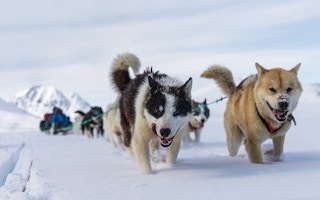Greenland’s Arctic dogs, a key part of the massive island’s life and culture, are disappearing.
According to local scientists and specialists in Denmark, the population of the dogs – traditionally used for transporting people and goods across Greenland’s vast snowy landscape and also for sled racing – has fallen by more than 50 per cent over the past 20 years.
Professor Morten Meldgaard of the Natural History Museum of Denmark, says global warming and the continuing melt of sea ice in the Arctic region is one of the main reasons for the decline in sled dog numbers.
The ice is not only reducing in area but also becoming thinner; local people no longer venture out on the ice as much as they once did to hunt and fish. Therefore fewer sled dogs are needed, and part of Greenland’s culture is dying.
“Many don’t know how fantastically unique the dog culture is,” says Meldgaard. “It’s part of Greenland’s identity, over 1,000 years old and the biggest working dog culture in the world.
Other causes
“Genetically, sled dogs are also extremely strong and resilient – we can be very proud of having a living sled dog culture and we should take care of it.” It’s estimated there are now fewer than 15,000 sled dogs left in Greenland.
“
Many don’t know how fantastically unique the dog culture is. It’s part of Greenland’s identity, over 1,000 years old and the biggest working dog culture in the world.
Morten Meldgaard, Natural History Museum of Denmark
The decline in dog numbers is due to other factors besides changes in climate, says Meldgaard. Motorised snowmobiles are taking the place of dogs in many parts of the island. The price of food for the dogs has also been rising; fish waste, a traditional part of their diet, is not so plentiful as it once was, as catches decline.
The dogs are also becoming exposed to more infectious diseases. Scientists and medical experts say that rising temperatures in the Arctic and other regions can facilitate the spread of various diseases among both animal and human populations.
In order to save the existing dog population, the Greenland government is investing nearly one million US dollars in a sled dog vaccination programme.
Helping the handicapped
Meldgaard and other scientists have put forward a series of recommendations aimed at halting the dogs’ decline.
“Traditional hunters and fishermen are under pressure, so we should find new ways to use sled dogs”, says Meldgaard. “There are many options; sled dogs can, for example, be used as transport for tourists, as companions to tourists in the field, or to help handicapped children.”
He and his team are also recommending that sled dogs be awarded UNESCO world heritage protection. “The goal is to find some way forward to create a sustainable dog culture”, says Meldgaard.
“The recommendations address both decision-makers and dog sled drivers. The hope is that they can help secure the dog population and the culture’s survival.”
During an environmental expedition to the Arctic region, this correspondent also saw the impact rising temperatures were having on sled dogs.
In Illulissat, on Greenland’s west coast, packs of dogs roamed the town’s streets; they are used to being worked hard, and without activity they can be aggressive.
Local people take enormous pride in their teams of dogs. Sled racing is a central part of the culture, and the ever-increasing pace of the ice melt means races can no longer be held in many areas.
“Sled racing is central to life in Greenland, especially for our young men”, said a local geologist. “Besides fishing, there are few other activities. The future of our culture is in danger.”
This story was published with permission from Climate News Network.










